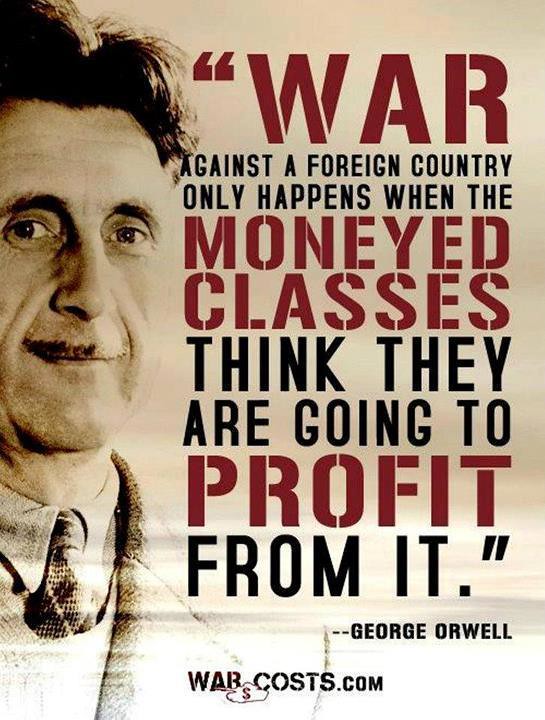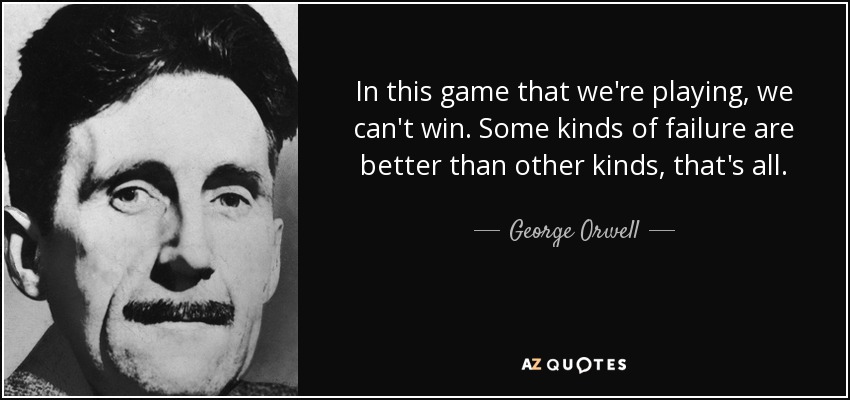The sore facts of a failing life
_ 1___Feeling rejected? George Orwell did, too.
Some writers are more equal than others, but many writers, some of whom I prefer to Orwell, have responded imaginatively to past and present modern societies:
- Huxley's or Chomsky's conclusions and challenges can't be reduced to Orwell's call to "common sense and [English] decency"
_ 2 __ on life goes on
- In 1952 Sonia Orwell (her 2nd wife) donated the original manuscript of Nineteen Eighty-Four to a charity auction, at which it fetched a paltry £50. It was bought by a book dealer in the United States and is now in private hands.
___ PART I ___ from fail to failing AND failure
Failure, as Terry Eagleton says, was Orwell’s forte.

- He managed to pioneer what is now known as cultural studies. In a remarkable feat of self-refashioning, he turned his back on a life of middle-class privilege and chose for his companions tramps, hop-pickers, Catalonian revolutionaries, louche artists and political activists.
- Orwell thought that the Spanish Civil War provided evidence that the concept of objective truth was falling out of fashion.
- Orwell was a kind of literary proletarian who lived in dire straits for most of his life (see list of jobs below) ,
- Everyone’s got to pay the bills, and Blair was no exception. He spent most of his career juggling part-time jobs while authoring books on the side.
- and began to earn serious money from his writing only when he was approaching death.
_____ list of jobs
- Dishwasher, Paris hotel (1929)
- Private tutor, England (1930)
- Hop picker (1931)
- Teacher, Hawthorne High School for Boys (1932-1933)
- Teacher, Frays College (1933-1934)
- Clerk, Booklover’s Corner used bookstore (1934-1935)
- Volunteer soldier, Spanish Republican Government (1937)
- Talks producer, BBC Eastern Service (1941-1943)
- Volunteer, Home Guard (1940-1943)
- Literary editor, Tribune (1943-1945)
___ PART II ___ odd tasks
ORWELL ADN money
- Orwell was himself a struggling writer working part-time in a Hampstead bookshop in 1934, with no money to spend.
- In 1939 he even ran a small shop in Hertfordshire, where he had a goat, Muriel.
- His dislike of his early novels (20's and 30's) arose from his incredibly strong sense that he would always be a literary failure.
- George Orwell’s lesser-known works “Keep the Aspidistra Flying” (1936)—a novel he was thoroughly dissatisfied with, brought him quite a pain in his pride and money matters. It was not a particularly happy one for Orwell. He had numerous run-ins with his publishers and receives bad reviews. The misfortunes did not end there. Many of the first print run of 3,000 were lost in a bombing raid in the early years of world war two.
- Homage to Catalonia (1938), his brilliant account of his time on the frontlines in the Spanish civil war of 1936-1937 actually sold only 700 copies during his lifetime)
___ PART III ___ before success: Animal Farm and 1984
- Their family home was demolished in 1944 by a German bomb...Orwell would return to the foundation where his home once stood and sift through the rubble in search of his manuscript for Animal Farm. After he spent hours and hours rifling through rubbish, he found it.
- In 1944 Soviet spy Peter Smollett from the Ministry of Information seems to have advised British publishers not to issue Animal Farm ....
- For its Publishing Struggles see part V below
For an article on money & his foundation.... here
- The success of “Animal Farm” at last brought Orwell some financial relief: he could afford to cut back on his journalism and devote more time to his next novel. He took a house on Jura, a windy, remote island off the western coast of Scotland.
- in 1947 while taking a break from writing Nineteen Eighty-Four, Orwell took his son, niece, and nephew on a boating trip.... their boat capsized when it was sucked into a whirlpool, hurling them all overboard. Fortunately, all four survived. There, growing more ill each day, he completed it.
- He lived only seven months after its publication, long enough to realize that his book was becoming enormously successful and widely misunderstood. He attempted a note of clarification: ‘My recent novel is NOT intended as an attack on socialism or on the British Labor Party....." Few listened.
- on his death bed, he heard that Nineteen Eighty-Four had been bought by the Book-of-the-Month Club in America in a deal which his publisher estimated would earn him £40,000. Orwell was dead before the money arrived.
___ PART IV ___ real failure was success
- Orwell never seems to have taken the least interest in success.
- Failure was a leitmotif of his fiction. For him, it was what was real.
- All of his fictional protagonists are humbled and defeated, this may be arraigned as unduly pessimistic.
- Orwell, like Freud but unlike Marx, has passed into the common language. Orwell at his worst seemed to imagine that common sense was socialism. ‘My chief hope for the future,’ he wrote, ‘is that the common people have never parted company with their moral code.’ He found in the Catalonian working class a solidarity which was an earnest of the political future.
___ PART V ___Rejection
Orwell said when he wrote the book, in 1943:
“It was obvious that there would be great difficulty in getting it published.”“If publishers and editors exert themselves to keep certain topics out of print, it is not because they are frightened of prosecution, but because they are frightened of public opinion. In this country intellectual cowardice is the worst enemy a writer or journalist has to face, and that fact does not seem to me to have had the discussion it deserves.”
Rejection Note on Animal Farm:
Orwell received four rejections, including one from his usual publisher who said releasing such a politically controversial work would be “ill-advised” during what was then the height of World War II.
But Orwell got the last word. Animal Farm arrived on bookshelves in 1945 thanks to Secker & Warburg, with Orwell using the preface to share this dismal reflection on self-censorship: “Anyone who challenges the prevailing orthodoxy finds himself silenced with surprising effectiveness.”
Knof Publishing:
George Orwell's Animal Farm was rejected by Knopf Publishing Company on September 18, 1945. The manuscript was described in the rejection note as a
“stupid and pointless fable in which the animals take over a farm and run it, and their society takes about the course of the Soviet Union as seen by Westbrook Pegler. It all goes to show that a parallel carried out to the last detail is boring and obvious. Even Pegler gets off a few smart lines now and then but this is damn dull. Very very NFK.”
It was rejected earlier by T.S. Eliot writing on behalf of Faber and Faber in a letter dated 13 July 1944. TS Eliot rejects George Orwell’s allegory Animal Farm because
“we have no conviction … that this is the right point of view from which to criticise the political situation”
Here's the facsimile published on the British Library website:



No comments:
Post a Comment